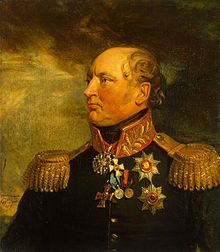Friedrich von Löwis of Menar
You can help expand this article with text translated from the corresponding article in Russian. (May 2011) Click [show] for important translation instructions.
|
Friedrich von Löwis of Menar | |
|---|---|
 Portrait by George Dawe | |
| Born | 6 September [O.S. 26 August] 1767 Hapsal, Kreis Wiek, Reval Governorate, Russian Empire (present-day Haapsalu, Lääne County, Estonia) |
| Died | 16 April [O.S. 4] 1824 (aged 57) Sehlen Manor, Sehlen, Kreis Wolmar, Governorate of Livonia, Russian Empire (in present-day Sēļi, Mazsalaca Municipality, Latvia) |
| Buried | |
| Allegiance | |
| Service/ | |
| Years of service | 1772–1814 |
| Rank | Lieutenant-General |
| Battles/wars | Napoleonic Wars (Siege of Danzig (1813)) |
| Awards | Order of St. George 3rd class, Order of St. Alexander Nevsky, Order of St. Vladimir 2nd class, Order of St. Anna 1st class with diamonds, Gold Sword for Bravery with diamonds |
Friedrich von[1] Löwis of Menar (Russian: Фёдор Фёдорович Левиз, romanized: Fëdor Fëdorovič Leviz; 6 September [O.S. 26 August] 1767 – 16 April [O.S. 4] 1824) was a Baltic German lieutenant-general of Scottish origin, who served in the Imperial Russian Army during the Napoleonic Wars. His family (the family name commonly spelled in English as Lewis) came from South Scotland to Sweden around 1630. By the time of Friedrich's birth, it had become a well-established noble family settled in Livonia in the Russian Empire.

References[edit]
- ^ In German personal names, von is a preposition which approximately means of or from and usually denotes some sort of nobility. While von (always lower case) is part of the family name or territorial designation, not a first or middle name, if the noble is referred to by his last name, use Schiller, Clausewitz or Goethe, not von Schiller, etc.
Further reading[edit]
- Henning von Löwis of Menar (Author), Ich wäre gern geblieben. Das Leben des Friedrich von Löwis of Menar, Verlag: Hinstorff/PRO; Auflage: 1., Aufl. (7. Dezember 2005), ISBN 3-86167-151-4
- Reinhold von Klot, Generalleutnant Friedrich von Löwis of Menar, Retter der Stadt Riga im August 1812, in: Baltische Briefe, Nr. 3/4 (797/798) März/April 2015, Hrsg. Ingeborg v. Kleist, Verlag Baltische Briefe – Wolf J. v. Kleist GmbH
External links[edit]
- Russian Generals of the Napoleonic Wars: Lieutenant General Friedrich von Lowis of Menar by Alexander Mikaberidze
Categories:
- 1767 births
- 1824 deaths
- People from the Russian Empire of Scottish descent
- Russian commanders of the Napoleonic Wars
- Recipients of the Order of St. George of the Third Degree
- Recipients of the Order of St. Vladimir, 2nd class
- Recipients of the Order of St. Anna, 1st class
- Recipients of the Gold Sword for Bravery
- Nobility from the Russian Empire
- Napoleonic Wars stubs
- Ethnic German people from the Russian Empire
